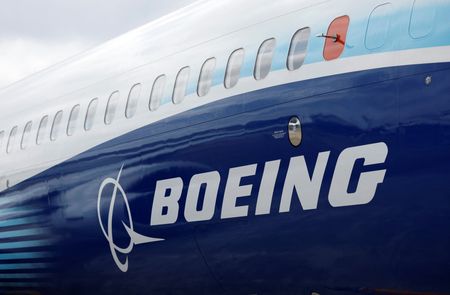By Sophie Yu and Valerie Insinna
(Reuters) -Boeing on Thursday made its first direct delivery of a 787 Dreamliner to China since 2019, a step that could hasten the end of China’s freeze on deliveries of Boeing’s profit-making 737 MAX after more than four years.
A 787-9 for Juneyao Airlines, a privately owned Chinese carrier, took off from Everett Paine Field in Washington state at 11:24 a.m. Pacific Time and headed toward Shanghai, data from Flightradar 24 showed.
Boeing confirmed the delivery in a statement.
Before the U.S. stock market opened, Boeing shares jumped about 1.6% on news of the imminent announcement and were flat during afternoon trade.
China suspended most orders and deliveries of Boeing planes in 2019 after 737 MAX was grounded worldwide following two fatal crashes.
A restart of MAX deliveries would represent a reset of Boeing’s relationship with China and be a bigger financial boon that allows it to offload dozens of planes in its inventory, but this Dreamliner delivery is also seen as a stepping stone for a larger breakthrough in deliveries and orders.
“This is clearly a move by the (Chinese) government that might just signal to the airlines that they’re free to take deliveries and perhaps even place orders,” said Richard Aboulafia of AeroDynamic Advisories.
Boeing last delivered a leased Dreamliner plane to a Chinese customer in 2021, but no 787s have been handed over directly to Chinese airlines since November 2019.
Analysts have expected the resumption of Dreamliner deliveries to China after consultancy AAP/AIR this month reported preparatory flight activities for a 787 designated for Juneyao Airlines, registered as B-20EQ.
Twelve of the 60 undelivered 787s in Boeing’s inventory are dedicated for Chinese operators, Jefferies said Tuesday.
For Boeing, restarting deliveries would symbolize the re-opening of doors to one of the most important aerospace markets, which Boeing projects will compose 20% of the world’s aircraft demand through 2042.
While any progress with China is good news, Boeing’s future business with Chinese airlines will remain vulnerable to geopolitical shifts between Washington and Beijing, said Rob Stallard of Vertical Research Partners.
“I would be surprised if Boeing feels inclined to raise its 2025-26 guidance,” he said.
A PATH TO MAX DELIVERIES
On Wednesday, trade publication The Air Current said Boeing had this month won a key clearance from China’s aviation regulator, the Civil Aviation Administration of China (CAAC), allowing the planemaker to prepare MAX aircraft for delivery.
The safety bans have been lifted as existing MAX planes are flying inside China, but new deliveries have remained on hold.
The CAAC’s deputy head on Dec. 8 told a Boeing executive in Beijing the planemaker was welcome to deepen its development in the Chinese market, Reuters reported. The Air Current, citing unidentified sources, said the regulator’s clearance was granted that day.
Individual MAX deliveries to China still need approval from China’s National Development and Reform Commission (NDRC), the Air Current report said.
The CAAC and NDRC did not immediately respond to Reuters’ requests for comment.
A 737 MAX designated for China Southern Airlines flew from Boeing Field in Seattle to Boeing’s nearby facility in Moses Lake, Washington, and back on Wednesday afternoon, according to data from flight tracking website FlightRadar24.
Analysts from Jefferies and Deutsche Bank said in investor notes that it appeared to be a customer acceptance flight – a test flight operated by an airline pilot that occurs before delivery.
MAX deliveries to China could provide some upside to Boeing’s $10 billion free cash flow target for 2025-2026, as that projection did not factor in potential deliveries to China, analysts have said.
Boeing has maintained 85 MAXs for Chinese customers in its inventory of about 220 planes, and collects the bulk of its payment upon delivery.
(Reporting by Sophie Yu in Beijing; Kanishka Singh, Costas Pitas and Valerie Insinna in Washington; Writing by Lisa Barrington; Editing by Jamie Freed, Mark Potter, Nick Zieminski and David Gregorio)

